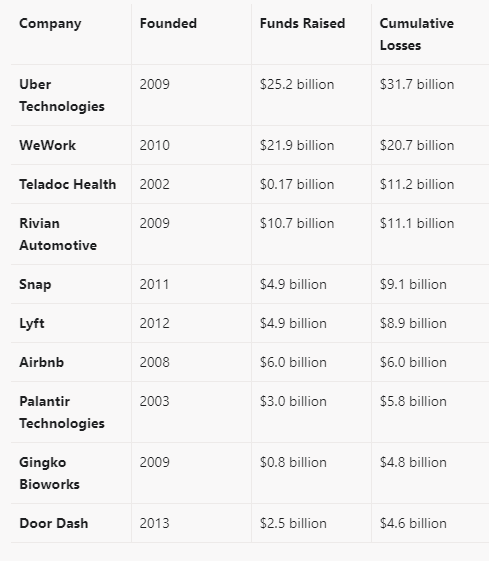What do all of these statements have in common?
- The Tryptophan In Turkey Makes You Sleepy.
- The 5-Second Rule Means Food On The Floor Is Safe To Eat.
- Cracking Your Knuckles Gives You Arthritis.
- Dogs Are Color Blind.
- Humans Only Use 10 Percent Of Their Brains.
- Sitting Too Close To The TV Is Bad For Your Eyes.
- Shaving Makes Your Hair Grow Back Thicker.
- Swallowed Gum Takes 7 Years To Digest.
- You Shouldn’t Go Swimming Right After You Eat.
- Sharks Can Smell Just A Drop Of Blood From Miles Away.
- Goldfish Have 3-Second Memories.
- You Need Eight Glasses Of Water A Day.
- T-Rex Dinosaurs Never Used Their Tiny Arms.
What all of the above statements have in common is that they’re all myths.
Do you know what else is a myth? That Wall Street unicorns are a good investment. What is a unicorn? A unicorn is a term used in private capital to describe a startup company valued over $1 billion.
These are companies that generated a lot of hype in the startup phase and attracted a lot of investment capital. Many of these unicorns eventually go public with the promise of rewarding investors and realizing their potential in the market. The problem with many popular unicorns is that most fail and fail spectacularly.
Just because a company garners hype on Wall Street doesn’t mean it’s successful. Many companies investors would think were a good bet are the opposite of that perception and are bad bets. Some of the most popular startups in recent memory have been some of the biggest failures in history.
The table below shows the funds raised by the ten biggest money-losing startups in the U.S. Cumulatively, they raised $80.1 billion in startup funds and have lost $113.9 billion.

The list above is a who’s who of recent Wall Street darlings, but they’re just the latest in a long line of unicorn companies that over-promise but underdeliver.
The problem with unicorns is that investors can’t help themselves even though many have never been profitable. Mainstream investors ignore the underlying economics and tend to go with what’s popular to follow the herd or out of fear of missing out. The result is often significant portfolio losses.
The perception of most mainstream investors is that the only way to get rich with investing is to swing for the fences by betting on unicorns or other speculative investments like meme stocks or crypto and NFTs. This approach to investing is closer to gambling than investing with a realistic expected return on investment.
Smart investors don’t speculate. They avoid unicorns and the “next big thing.” They prefer boring and tried and true investments over untested and speculative assets. Here are the simple, boring objectives the ultra-wealthy live by to build and maintain wealth.
Instead of gambling, here are some simple rules smart, ultra-wealthy investors live by:
- Go Against the Flow. The ultra-wealthy zig when everyone else zags. That’s why they’re rich, and everyone else is middle-class or poor. Instead of speculative assets, the wealthy prefer tangible assets that you can touch and feel like commercial real estate (CRE) or income-producing businesses. Tangible assets appreciate over time and are insulated from Wall Street volatility.
- Cash Flow is King. Cash-flowing private assets like commercial real estate or private businesses are ideal for generating passive income that can be generated hands-off, which can be reinvested to compound wealth exponentially.
- Avoid Liquidity. Wall Street liquidity is the source of Wall Street volatility. The ability of investors to liquidate their holdings instantly and send the markets into a nosedive is why the wealthy avoid liquidity. That’s why they prefer private assets with long lockup periods that allow the asset or business to mature and insulate the asset from market runs and volatility.
- Take Advantage of the IRS. Passive CRE and private investments structured as partnerships offer multiple tax benefits, including deductions, depreciation, long-term capital gains treatment, and avoidance of self-employment taxes.
Unicorns aren’t the key to wealth; it’s the tangible, real-world assets that produce a proven commodity and that cash flow that are the key to building, compounding, and sustaining wealth.
